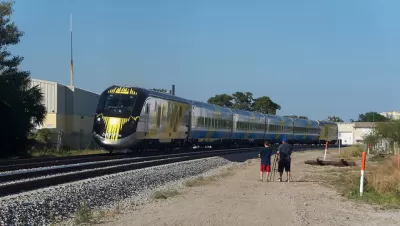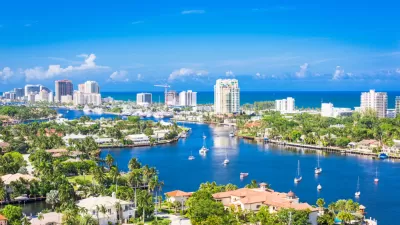The privately funded, diesel-powered trains will run at speeds up to 79 mph between West Palm Beach and Fort Lauderdale, with an extension to Miami opening early next year. Real estate development is key to profitability.

"The ambitious $3 billion Brightline express project will run along the state's densest population corridor with more than 6 million residents and a regular influx of tourists," reports Samantha Raphelson for WBUR News on Dec 7. According to the WBUR map [jpg], the trip from West Palm Beach to Fort Lauderdale will take 30 minutes and another 30 minutes to Miami when service begins.
The project, funded by All Aboard Florida, represents the first test into the long-awaited U.S. move into high-speed rail, says John Renne, director of the Center for Urban and Environmental Solutions at Florida Atlantic University.
Brightline is 'higher-speed rail,' not high-speed rail, which would require electrification (includes maglev rail) and grade separations at speeds above 125 mph, according to the Federal Railroad Administration. An extension to Orlando will enable speeds up to 125 mph. The trains will be powered by EPA Tier 4 compliant locomotives manufactured in Siemens' Sacramento, Calif. plant, which will also built the passenger cars.
"It's the first time that it's happening, being built by a private company," [Renne] tells Here & Now's Jeremy Hobson. "And that's kind of a game changer for this type of model."
“On a national level, the scale of impact could be enormous. It’s a proof of concept for private financing corridor-based infrastructure,” says Adie Tomer, a fellow at the Brookings Institution Metropolitan Policy Program, in a piece by Chris Persaud in Next City on Oct 23, 2017.
Profits to come from real estate, not train tickets
Beyond slashing travel times, Renne says the construction of private mixed-use real estate developments at each station will bring in hundreds of millions of dollars in new revenue. He explains that potential revenue was lost when the government shifted control of transportation to the public sector in the 1920s [or 30s].
When that happened, we lost the connection between the development around the stations and the rail service itself, and we started building a lot of parking lots around the stations," he says. [Renne expands on the relationship between real estate development and train profitability in the audio version].
"The research shows that the transportation service itself rarely makes a profit," he says. "But when you combine the real estate and development opportunities with the transportation service, you can ... actually get to a very profitable outcome."
Unlike the nation's two high-speed rail projects in Texas and California, Brightline will operate in a corridor already owned by All Aboard Florida's parent company, Florida East Coast Industries. "The return to passenger trains will revive a line that stopped running on those old tracks in the 1960s, with the arrival of the federal highway program," writes Raphelson.
Opposition
Like it's semi-counterpart in California, the rail line has sparked litigation by jurisdictions in the corridor. "Two counties along the wealthy Treasure Coast sued to stop the Brightline project, arguing it poses significant safety concerns and would likely delay commuters in cars," adds Raphelson. "Most of those lawsuits have been tossed out or dropped."
The boating industry has also raised objections due to the requirement that drawbridges remain down for trains to use them.
Fares
A 2015 study commissioned by the company suggests it will cost at least $16 to travel from West Palm to Miami – about $10 more than the price to travel a similar route on South Florida's government-run passenger train.
Renne is also extensively quoted in the October Next City piece that goes into much greater depth on the political opposition, and support, along the Treasure Coast.
FULL STORY: Florida Set To Launch Country's First Private High-Speed Train Service

Maui's Vacation Rental Debate Turns Ugly
Verbal attacks, misinformation campaigns and fistfights plague a high-stakes debate to convert thousands of vacation rentals into long-term housing.

Planetizen Federal Action Tracker
A weekly monitor of how Trump’s orders and actions are impacting planners and planning in America.

In Urban Planning, AI Prompting Could be the New Design Thinking
Creativity has long been key to great urban design. What if we see AI as our new creative partner?

King County Supportive Housing Program Offers Hope for Unhoused Residents
The county is taking a ‘Housing First’ approach that prioritizes getting people into housing, then offering wraparound supportive services.

Researchers Use AI to Get Clearer Picture of US Housing
Analysts are using artificial intelligence to supercharge their research by allowing them to comb through data faster. Though these AI tools can be error prone, they save time and housing researchers are optimistic about the future.

Making Shared Micromobility More Inclusive
Cities and shared mobility system operators can do more to include people with disabilities in planning and operations, per a new report.
Urban Design for Planners 1: Software Tools
This six-course series explores essential urban design concepts using open source software and equips planners with the tools they need to participate fully in the urban design process.
Planning for Universal Design
Learn the tools for implementing Universal Design in planning regulations.
planning NEXT
Appalachian Highlands Housing Partners
Mpact (founded as Rail~Volution)
City of Camden Redevelopment Agency
City of Astoria
City of Portland
City of Laramie




























